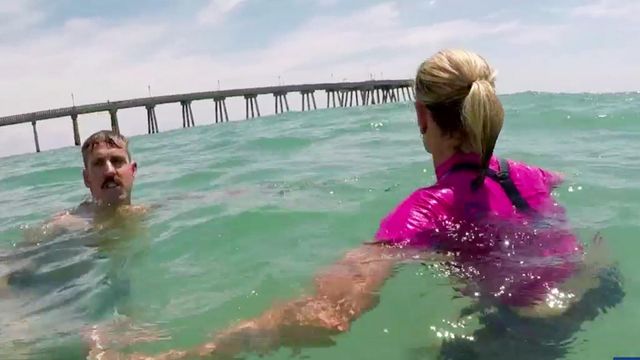What is a rip current? What to do if you feel the pull
Each year, lifeguards along the Carolina coast rescue hundreds of people. The majority of those swimmers are those caught in rip currents.
Posted — UpdatedIn an effort to help save lives, WRAL's Amanda Lamb headed to the coast to talk with lifeguards who rescue hundreds of people each year from rip currents.
Lt. John Scull, with the Wrightsville Beach Fire Department Ocean Rescue Team, says rip currents are nearly impossible to see, unless you're trained to spot them.
You can spot a rip current from the shore
"What you're going to look for when you're looking for these rip currents is any kind of break in the waves," he said. "Any kind of suspended sediment going out, and if you look carefully, you can actually see water moving backwards in the current."
Lamb joined Scull in the water for a demonstration. In less than a minute, they were both caught in the rip current.
"I can feel it. And not only can I feel it, I can see it," Lamb said. "Basically, we could just not be paying attention and it is pulling us out."
Remain calm if caught in a rip current
Scull says the first rule to survival is remaining calm.
"One of the biggest things is being able to relax, learning how to float," he said. "The other thing is learning how to tread water."
As the rip current continues to pull you away from the shore, you must swim.
"Once you're in that situation where you can't touch ... you're going to have to swim," Scull said. "The easiest way is a side stroke and a few good kicks ... it's about energy conservation."
Scull emphasizes the importance of never swimming against the current.
"Swim parallel to shore," he said. "If we tried to turn around and swim against it, in a weak rip current, we might make it, but you're still going to get tired, and it's not something we want to do."
For a child, or anyone who does not know how to swim, these situations can be fatal.
"Practice these things in a pool," Scull recommends. "In a non-stressful environment. So, when the stress occurs, it's a lot easier to do."
According to Scull, if you're out in the water and need help, raise your hand and call for a rescue. A lifeguard with a flotation device is the key to saving lives, he said.
Each year, lifeguards along the Carolina coast rescue hundreds of people. The majority of those swimmers are those caught in rip currents.
Rip current safety tips
When at the beach
- Whenever possible, swim at a lifeguard-protected beach.
- Never swim alone.
- Learn how to swim in the surf. It's not the same as swimming in a pool or lake.
- Be cautious at all times, especially when swimming at unguarded beaches. If in doubt, don’t go out.
- Obey all instructions and orders from lifeguards. Lifeguards are trained to identify potential hazards. Ask a lifeguard about the conditions before entering the water. This is part of their job.
- Stay at least 100 feet away from piers and jetties. Permanent rip currents often exist along these structures.
- Consider using polarized sunglasses when at the beach. They will help you to spot signatures of rip currents by cutting down glare and reflected sunlight off the ocean’s surface.
- Pay especially close attention to children and elderly when at the beach. Even in shallow water, wave action can cause loss of footing.
If caught in a rip current
- Remain calm to conserve energy and think clearly.
- Never fight against the current.
- Think of it like a treadmill that cannot be turned off, which you need to step to the side of.
- Swim out of the current in a direction following the shoreline. When out of the current, swim at an angle – away from the current – toward shore.
- If you are unable to swim out of the rip current, float or calmly tread water. When out of the current, swim towards shore.
- If you are still unable to reach shore, draw attention to yourself by waving your arm and yelling for help.
If you see someone in trouble
- Don't become a victim, too.
- Get help from a lifeguard.
- If a lifeguard is not available, have someone call 911.
- Throw the rip current victim something that floats – a life jacket, a cooler, an inflatable ball.
- Yell instructions on how to escape.
- Remember, many people drown while trying to save someone else from a rip current.
• Credits
Copyright 2024 by Capitol Broadcasting Company. All rights reserved. This material may not be published, broadcast, rewritten or redistributed.






